Government’s motion to dismiss contract and takings claims for lack of jurisdiction is granted. The plaintiff alleged the FCC breached an implied contract, effected a taking, and violated the Communications Act of 1934 when it cut plaintiff’s funding to provide telecommunications services in Hawaii. COFC found, however, that the plaintiff’s claims were essentially challenges to various FCC orders. Under the Communications Act and the Hobbs Act, only U.S. Courts of Appeal have jurisdiction to hear challenges to FCC orders.
Sandwich Isles Communications, Inc. (SIC) is a telecommunications provider. For several years, SIC received funding from two funds controlled by the Federal Communications Commission—the Universal Service Fund and the National Exchange Carriers Association—to provide telecommunications services in Hawaii. But due to a variety of factors—including excessive costs, rule changes, and the fact that SIC’s manager was convicted of violating the tax code—the FCC cut funding and ordered SIC to return over $27 million in overpayments.
SIC brought suit in the Court of Federal Claims alleging that by reducing funding, the FCC had breached an implied-in-fact contract, effected a taking of SIC’s property interests, and violated the Communications Act of 1934 and 1996. The government, however, moved to dismiss SIC’s complaint, arguing that COFC lacked jurisdiction.
The court agreed with the government. The Communications Act of 1934 states that any proceeding challenging an FCC order must be brought in the manner prescribed by the Hobbs Act. The Hobbs Act, in turn, states that U.S. Courts of Appeal, excluding the Federal Circuit, have jurisdiction to hear challenges to an FCC order. Indeed, under the Hobbs Act, certain FCC order can only be reviewed by the D.C. Circuit.
The court then determined the “true nature” of SIC’s claims. Although SIC had characterized its claims as contract and takings causes of action, it seemed apparent to the court that the claims really focused on challenges to the validity and propriety of FCC orders. Indeed, the court traced each of SIC’s allegation concerning the loss of funding to specific FCC orders. SIC contended that it was not challenging the substance of the FCC orders, but it was clear to the court that SIC’s causes of action were really an attempt to circumvent those orders.
SIC is represented by Lex R. Smith of Kobayashi, Sugita & Goda. The government is represented by Shari A. Rose of the U.S. Department of Justice.




